#situational mutism
Text
Easily Overlooked Autistic Traits
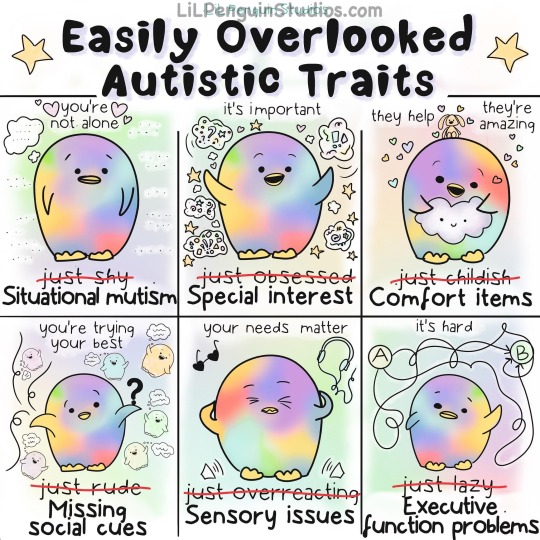
Situational Mutism
Special interests
Comfort items
Missing social cues
Sensory issues
Executive function problems
Lil Penguin Studios/Autism Happy Place
#autism#actually autistic#easily overlooked traits#signs of autism#executive function problems#comfort items#missing social cues#special interest#situational mutism#sensory issues#neurodivergence#neurodiversity#actually neurodivergent#feel free to share/reblog#lil penguin studios/autism happy place (facebook)
917 notes
·
View notes
Text
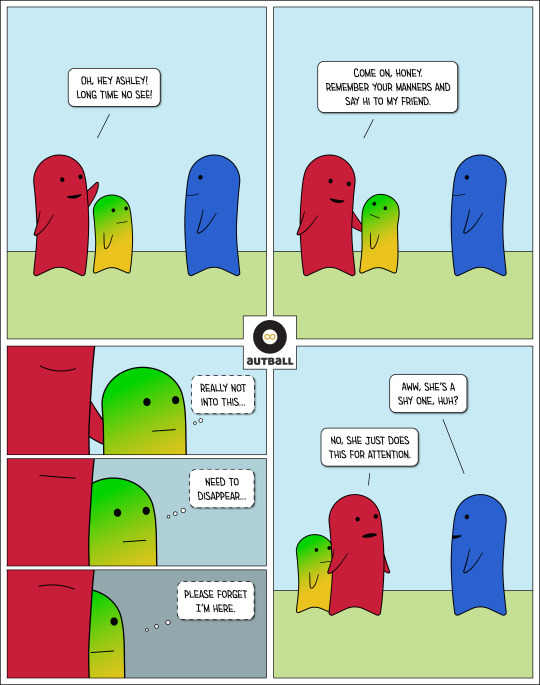
If your efforts to avoid attention only brought you more attention, were you ever really trying to avoid it at all?
(Yes. Yes I was.)
#autistic#actually autistic#autism#autistic problems#autistic experiences#autistic feels#exposure anxiety#situational mutism
1K notes
·
View notes
Text
someone with speech difficulties is not "refusing to speak" to piss you off specifically. whether someone is able to speak or not is completely out of their control, and I can promise that you getting annoyed at them (or choosing to ignore their other communication methods) isn't helping
4K notes
·
View notes
Text
hyperspecific good morning, night, afternoon, evening, void-hour to people with:
breathy voices
voices that cut off halfway though
choppy voices
whispering voices
higher pitched voices
no voices
mechanic-sounded voices
augmented voices
monotone voices
inaudible voices
voices that barely get through
voices that repeat
voices that skip syllables
voices that pause between words
voices that shake and waver in pitch and volume
voices that clutter
voices that stutter
voices that make sounds not words
🌹🌹
#situational mutism#selective mutism#aac positivity#vocal diversity#gentle reminders#positive reminders#sm tag
1K notes
·
View notes
Text
Reminder not to change topic when you know AAC user is typing!!! Let us add to topic before continuing!
#aac#aac user#autism#nonspeaking autistic#nonverbal#semiverbal#semispeaking#non reliably speaking#selective mutism#situational mutism#mute#nonspeaking#augmentative and alternative communication#aac users#aac app
354 notes
·
View notes
Text
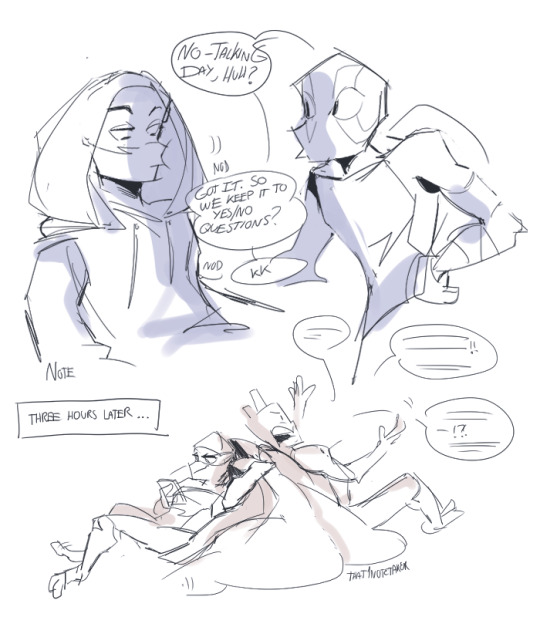
Headcanon that whenever Donnie has a Talking Is Hard sort of day, Leo is actually the one that gets him talking right up again. Must be a twin thing.
#my art#tmnt#rottmnt#rottmnt leo#leonardo#leonardo tmnt#donatello#donatello tmnt#donatello rise of the teenage mutant ninja turtles#donnie#donnie fanart#comic#art#note draws things#comic strip#mutism#selective mutism#situational mutism#rise of the teenage mutant ninja turtles art#rise of the teenage mutant ninja turtles fanart#rise of the teenage mutant ninja turtles#rottmnt fanart
542 notes
·
View notes
Text
The beginner autistic guide to common terms in our community (with extra context!).
*Disclaimer, I’m not a professional. This is just knowledge from my experience as an autistic person. Please feel free to correct anything :)
These definitions will include some of my own opinions and thoughts, especially on the more controversial terms. This is simply to help better prepare new autistic community members for conversations they become engaged in. Having all the perspective and context you can have can be very helpful when moving into new social spaces.
Autism (Or Autistic Spectrum Disorder, ASD): A neurodevelopmental disorder that is present from very early childhood. It’s mostly recognised through difficulties with social interaction and restricted and/or repetitive behaviours. The way it is referred to as “Autism Spectrum Disorder” is specifically referring to the fact that autism presents in countless ways. There are common traits and patterns, but the severity and complexity of those traits and symptoms is infinite.
NOTE: This does not mean that ‘everyone is a little bit autistic’. You are either autistic or you are not. It just means that if you have autism, it may present very differently to other autistic people you know.
Asperger’s Syndrome: Asperger’s syndrome is usually considered an older term for a ‘subtype’ of autism. The term is considered outdated by the DSM-5 and no longer used in that document. However it is still used in a lot of other countries. Now it is becoming more socially known that ‘Asperger’s syndrome’ is just a specific presentation of autism. Many autistics don’t like the use of the word ‘Asperger’s’ because of a couple reasons:
The term has a long history with NAZI’s and eugenics.
The term seems to basically mean ‘high functioning’ autistic, which simplifies the condition.
Asperger’s Syndrome is defined in a very similar way to autism, however people with “Asperger’s’ may be described as ‘gifted’ or ‘intellectual’.
It’s important to note that many people still identify themselves with the term ‘Asperger’s’. While it is good to be educated and up to date with terminology, some people have identified with this term their whole life and it’s not wrong to use the term for one-self. But either way, I do encourage you to do more research if you are comfortable.
Neurotype: Can be basically defined as the type of brain function one has. Some people consider autism a neurotype, and then neurotypical as another neurotype. However, many people claim that autism is ‘just another neurotype’. This is a harmful way of thinking about autism because autism is a disability. Labelling it as a ‘neurotype’ belittles all the struggles autistic people have that make them disabled. Autism is a spectrum and so some autistic people may not really consider themselves disabled, but many do.
Neurotypical (NT): A non-autistic person with no other mental conditions.
Allistic: A non-autistic person who can still have other mental conditions, such as depression or ADHD.
Neurodivergent (ND): Traditionally ‘Neurodivergent’ has been used to mean either autistic or ADHD. However in some contexts it is used to mean someone with any mental condition, including personality disorders or mental illnesses such as depression and anxiety.
Neurodiversity: a term used to describe the fact that there are many neurotypes in the world. It is used to imply that differences in brain development and function should be accepted as relatively normal. I think this is a good sentiment, but that some neurotypes should still be considered disabilities as well as a neurotype, so as not to diminish the struggles specific neurotypes go through.
High functioning/Low functioning: The labels of functioning are terms used to describe how independent an autistic (or other kind of disabled) person is able to be. Many autistics do NOT like the use of these terms for a couple reasons:
It tends to focus on the way an autistics disability affects the allistic people around them.
It simplifies the experience of the individual with autism to how independent they are, and is also not very descriptive for anyone trying to help the said autistic person.
High needs/Low needs: These are labels used to describe how much assistance an autistic (or other kind of disabled) person may need. It is slightly preferred by autistic people as the language is more centred to what the autistic person needs, rather than how independent they can be.
NOTE, many autistic people would argue that these terms are basically the same as high functioning and low functioning. I personally consider it to be best to just state someones highest needs or difficulties. For example “Olivia is nonverbal and highly sensitive to light and noise.”.
Masking: Masking is the act of hiding ones autistic traits to appear to be neurotypical. Masking is often a survival strategy developed by autistics to evade bullying or isolation. Masking can include suppressing the urge to stim, forcing oneself to make eye contact, learning how to ‘properly’ execute facial expressions, studying body language, etc. Masking can be an extremely vital skill for autistic people, but when an autistic person has to mask for long periods of time it can lead to negative consequences such as burn out or meltdowns. Masking can also be used in the context of other disabilities, such as ADHD.
Scripting: Scripting is a form of masking, when an autistic person pre-plans or practices responses or entire conversations. You may have a script you unconsciously follow for questions like “how are you?” Or “how is work?”, etc. It may be inspired from TV shows, movies or observing other people interact.
Burn out: Burn out is when an autistic person reaches their limit and has decreased energy for an extended period of time. Burn out may last anywhere between a couple days or a few years. Burn out is often caused by excessive masking, but can also be caused by repeated rejection, bullying or other mental conditions. Burn out is not the same as depression, but it can co-exist with depression.
Meltdown: A meltdown is when an autistic person experiences what might look like a ‘tantrum’. The person may be very angry, yelling, punching or hitting things (or themselves). They may be aggressively stimming or humming to themselves. A meltdown, internally, feels as if you are completely filled with negative energy, as if you might burst. It can feel like extreme irritation, or anger, or shame. Meltdowns can be caused by any number of stressful situations. For an autistic person this can be having a lot of social events, their routine being disrupted, having to eat foods they don’t like, being overstimulated, or even just negative social interactions.
Shutdown: A shutdown is very similar to a meltdown, in how it can be caused. For me personally, I tend to have a shutdown if I am not in a safe place to have a meltdown. From the outside it looks very similar to dissociation, and it can co-exist with dissociation. It typically feels like you are shutting down, turning off. You emotions were about to burst and then you just went numb. You may be unable to move, or go non-verbal. You may be crying quietly or you may simply just very suddenly feel the need to go home.
NOTE: Meltdowns and shutdowns can appear to feel like a panic attack, but they are different. Panic attacks come from intense feelings of dread or doom. Meltdowns and shutdowns come from repeated, or intense, stressful situations for an autistic.
Hypersensitive: Hypersensitivity is when the brain processes sensory input (such as touch, taste and smell) as much more intense than a neurotypical person would. This can mean that a slight cold breeze may feel painfully cold. Or looking outside a window can hurt ones eyes because it feels too bright. Or having to wear specific textures to stay calm.
Hyposensitive: Hyposensitivity is the opposite of hypersensitivity. It is when your brain inteprets sensory input as much less intense than a neurotypical would. Ways this can present in an autistic person include not realising when they hurt themselves, having a high pain tolerance, being unaware of temperature changes, etc. You may also not recognise your bodies hunger cues, dehydration or need for sleep.
NOTE: An autistic person can experience both hypersensitivity and hyposensitivity. It can also fluctuate day-to-day.
Sensory Processing Disorder (SPD): SPD is basically the term for experiencing lots of variation in your sensory input. It is similar to Auditory processing disorder. Which is where your hearing is technically fine (you aren’t any form of deaf), but you have trouble distinguishing what specific sounds are, or listening to one, important sound, in an area with lots of different noises (for example, being unable to understand what someone is saying next to you, because the TV is on.)
Overstimulation: This is when an autistic person has been experiencing too many different sensations at once, or for an extended period of time. This may be caused by too many noises happening at once. Or even just one annoying sound repeating for a long time. It can also be triggered by touch, taste, sight and smell.
Executive function/dysfunction: Executive function is the term used to describe how the brain initiates tasks. For neurodivergent folk, our executive function is often dysfunctional. This means we can often find it difficult to start new tasks. A way you may experience it is when you are sitting down, you may be screaming internally that you need to go and get some food, but your body seems unwilling to co-operate. Having executive dysfunction does not mean you are lazy, or do not want to do the task, it means you may be unable to do the task.
Autistic intertia: Autistic inertia is related to executive dysfunction, because it is a term that helps describe how autistic people struggle to switch or initiate tasks. “ An autistic at rest remains at rest, and an autistic in motion remains in motion”.
Special interest/Hyperfixation: A special interest is a extremely long term interest/obsession with a particular topic. An example might be being really into pokemon. Learning all the different types of pokemon, playing all the games and collecting heaps of merch. A hyperfixation is a more short-lived interest that can be destructive in it’s severity (for example, it might get so extreme that it’s the only thing you can think about, to the point where you neglect your needs). Special interests are less likely to be destructive. But hyperfixations can be healthy and normal too.
Stimming: Stimming or self stimulation is the act of doing repetitive movements to help self regulate. Stimming can look like spinning, chewing, flapping hands, dancing, foot tapping, pen clicking, touch soft fabrics, using weighted blankets, lighting candles, eating crunchy snacks, etc. All of these forms of movement or repetitive sensory input can help us regulate our emotions better, prevent a meltdown or shutdown, or focus on a task easier.
NOTE: Echolalia is another term you may hear. It is a form of stimming in which an autistic person repeats sounds/phrases over and over.
ADHD: Attention-deficit/hyperactivity disorder is a neurodevelopmental disorder like autism, but it affects the brain in different ways. It often presents as having difficulties with paying attention, regulating emotions and hyperactivity (or, alternatively, it can present as being inattentive).
Savant or Savant syndrome: A condition when someone with some type of significant mental disability is an expert/’savant’ in a particular field, to the point of surpassing neurotypical experts. An example might be having photographic memory, or being able to learn languages extremely easily, or being an extraordinary mathematician. Autistic people often don’t like to hear the term ‘savant’ as we are often only valued by ‘society’ if we are savants. And if we are not, then we are often treated as lesser. This is kind of a form of eugenics.
Eugenics: Eugenics is a philosophy or belief that we can selectively breed humans to ‘improve’ humanity. Or create the ‘perfect race’. This was an idealogy practiced by Adolf Hitler during WWII, which lead to the holocaust. Eugenics is often a subtly underlying philosophy behind many statements that, on face value, seem relatively harmless. For example - “autism is the next step in evolution” is currently a popular statement. However, this implies that every other neurotype is not an improvement, which therefore implies that being autistic is superior. This would be considered a form of eugenics. Eugenics is considered a horrible philosophy because it encourages people to look down on others and dehumanise anyone not like themselves.
Co-morbidity: A co-morbidity is the term used for a condition that is regularly seen in conjunction with another condition. For example, autism and ADHD are often seen together. However, it can also be used to simply describe someone who has more than one condition (physical or mental).
AuDHDer: Someone with autism and ADHD. Just a shortened way to refer to people with both disabilities.
Selective mutism/Situational mutism: When an autistic person (or other neurotype) experiences periods of being unable to speak or communicate. This can often occur in stressful situations, like before tests or during doctors appointments. It is officially referred to as ‘selective mutism’ but many are trying to change it to ‘situational mutism’ as the individual does not willingly choose when they go non-verbal.
Alexithymia: Alexithymia is typically described as the inability to define and/or describe ones emotions. So you may often feel a type of discomfort, but not be able to label what it is. Not being able to distinguish between anger and irritability. Or not knowing if you feel sad or confused. It can make seeking professional help for many conditions really difficult, as you are unable to put your experience into words. It can also be similar to hyposensitivity in the way that it makes it difficult to understand what you body is feeling.
Dyspraxia: Dyspraxia is a disorder that affects co-ordination, movement and balance. It can make things such as sports, driving, cooking and writing difficult. It is fairly common in autistic people.
Prosopagnosia: The inability to recognise/remember faces. It is more common in autistic people.
Synesthesia: Synesthesia is when one form of sensory input is sometimes also experienced as another. For example, someone with this condition may see colours when they hear someones name. They may hear a song and get a taste in their mouth. This is also more common in autistic people.
FINAL NOTE: Autism is a spectrum and you may not experience all of these different terms, or you may not experience them in the way I described them. That does not mean you aren’t autistic. This is not a diagnostic tool. This is simply a guide to learning the terms you may often hear when discussing autism.
#autism guide#autism#ASD#autism spectrum disorder#terminology#autistic terms#definition#neurodivergent#neurodiversity#allistic#aspergers#alexithymia#prosopagnosia#dyspraxia#actually autistic#synesthesia#auDHD#ADHD#autistic inertia#situational mutism#selective mutism
1K notes
·
View notes
Text

Speaking isn't the only form of communication! Just because I'm not speaking words doesn't mean I'm without them.
#autiebiographical#autie-biographical#non speaking#situational mutism#actually autistic#autism#autistic#web comic#comic strip#comic#slice of life
196 notes
·
View notes
Text
AAC users need access to all words. We need the ability to say if we were hurt, and to talk about our body parts. We need the ability to talk about the world, whether that be politics or relationships. I deserve to be able to say what I need to say.
Parents, and schools of AAC users, you need to do better. We deserve all the words people who use mouth words have.
#aac user#autism#actually autistic#nonspeaking#nonspeaking autistic#semispeaking#red instead#aac device#aac users#situational mutism#neurodivergent#disabled#autistic and queer
864 notes
·
View notes
Text
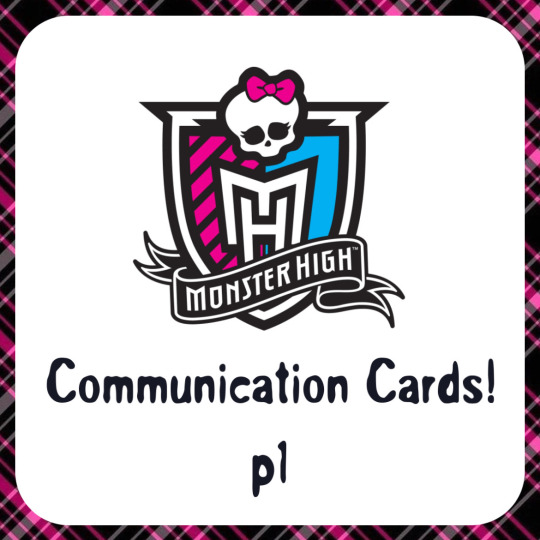

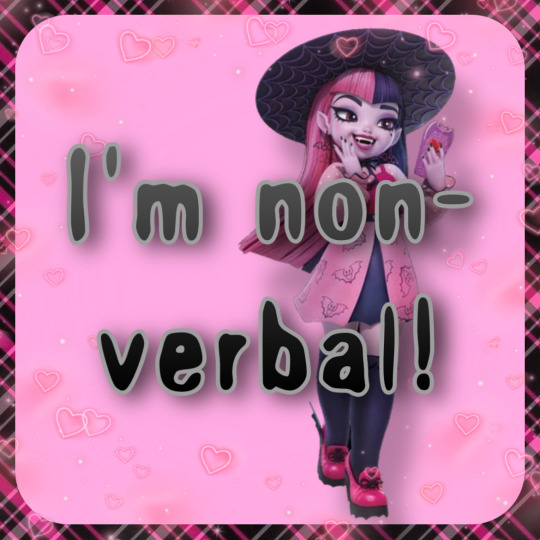





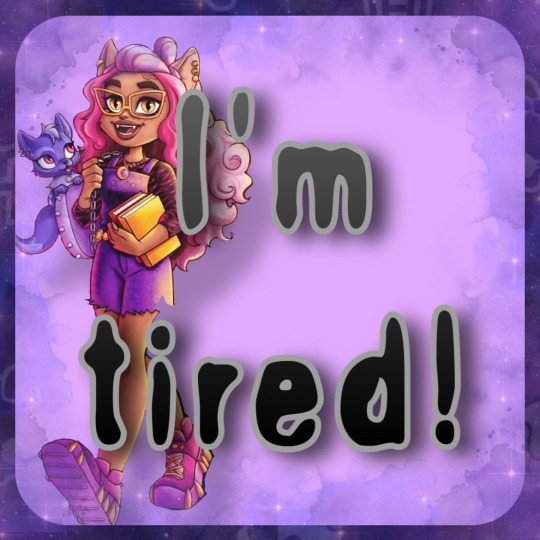

I’m someone with selective mutism, and I’ve always struggled to communicate my needs. It didn’t strike me with lightning until TODAY that I could create my own communication cards! Of course, anyone else can use them at their own free will, fully accessible and free of charge. And don’t worry, I’m going to be making more!
#monster high#frankie stein#draculaura#clawdeen wolf#communication#communication cards#com cards#actually autism#actually autistic#disability#disability awareness#disability pride month#selective mutism#situational mutism#mutism#assistance
248 notes
·
View notes
Text
Let’s Talk About Situational Mutism
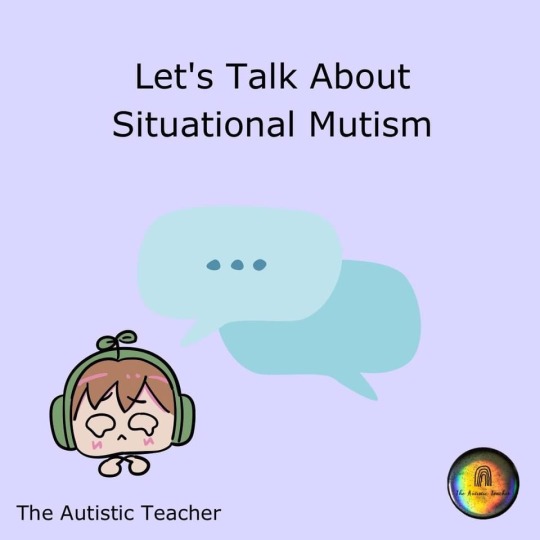

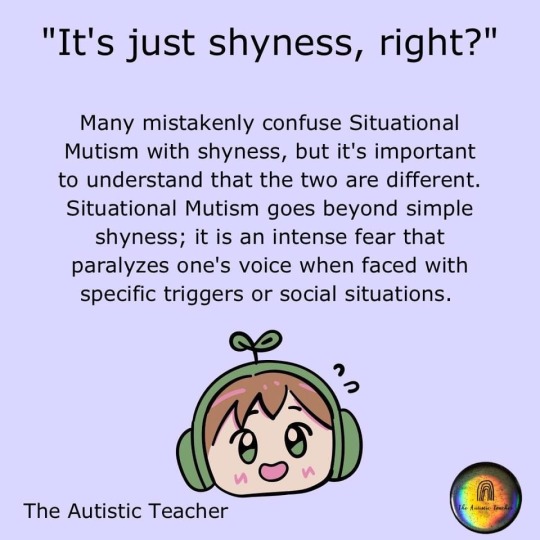

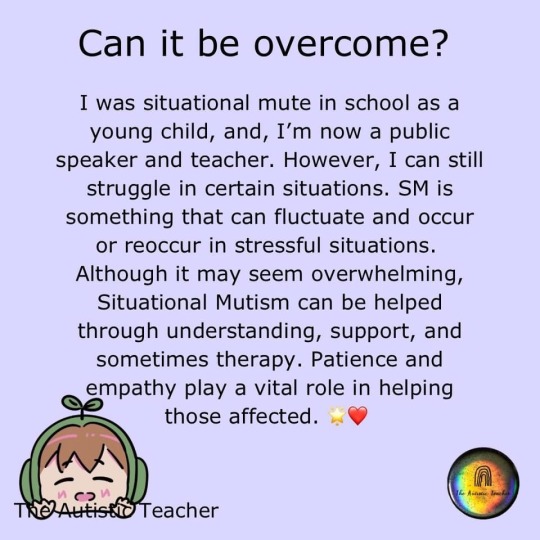

The Autistic Teacher
#autism#actually autistic#situational mutism#communication#it’s not just shyness#neurodivergence#neurodiversity#actually neurodivergent#feel free to reblog/share#The Autistic Teacher (Facebook)
550 notes
·
View notes
Text
Things I wish I'd see more in Fan Content/Fan Content would show when it comes to Characters headcanoned with Selective Mutism:
- the Anxiety Part of Selective Mutism (Freeze Response, Avoidance of Eye Contact, stiff Movements, etc)
- Characters using AACs, Pen and Paper or Gestures (nodding or shaking Head) instead of always Sign Language
- Characters who don't use Sign Language due to the Freeze Response making them unable to in the first Place
- Thoughts of the Character after going through a Freeze Response
- how Selective Mutism influences the Behaviour of a Character (avoiding going alone to certain Places without a Person they are close with, following or standing behind People they are close with who seem confident in their Abilities in navigating Places [Parents, outspoken Friends in School, etc], waiting for Confirmation in order to do certain Tasks [watching Classmates pick a Paper from the front Desk to see if it's okay for you to do as well as an Example], etc)
- Characteristics that seem contradictory (Character with Selective Mutism who is perceived as quiet and shy in public, yet they are outspoken and sometimes even loud around People they are close with)
- Character with Selective Mutism that isn't caused via Trauma (that would be traumatic Mutism) but through other Factors like Genetics
#selective mutism#situational mutism#A lot of these are based on my own Experiences-#Peeps who also have Selective Mutism; feel free to add your own Thoughts-
112 notes
·
View notes
Text
I don't mean to rant so much online, but it feels impossible to speak about my experience with disability without doing so. I have to navigate a world not meant for people like me, so yes, somedays I am tired, bitter, and resentful. Oftentimes, I can't express that to the people around me, so I come here instead.
I want to be authentic, and that does mean I share both the good and the bad. Sometimes, I need space to just be angry
#i wanted to make some point here but brainfog js kinda bad rn#might make another post later#autistic things#autism#actually neurodiverse#adhd#adhd stuff#autism problems#tic disorder#tics and tourettes#tourettes#tourettes syndrome#adhd problems#adhd things#selective mutism#situational mutism
78 notes
·
View notes
Text
be kind to that adult who never speaks at work, who’s strangely quiet at parties and dos.
be kind to the people who never smile, who seem stuck-up, emotionless or cold.
be kind to the person who only speaks when spoken to. who speaks in a very soft or quiet vocie. who speaks awkwardly and painfully.
tell them it’s okay if they can’t speak. tell them you care about them anyway. show them you see their talents.
support people with situational mutism. 🌹🌹
#situational mutism#selective mutism#quiet kid#social anxiety disorder#social anxitey#actually mentally ill#sm tag
437 notes
·
View notes
Text
Six Things Educators Must Know About Neurodivergent People
Six Things Educators Must Know About Neurodivergent People
Here are six things we think every educator must know about neurodivergent people. By understanding these, we make “all means all” more meaningful.
Spiky Profiles
Monotropism
Double Empathy Problem
Rejection Sensitive Dysphoria
Exposure Anxiety
Situational Mutism
Table of ContentsSpiky ProfilesMonotropism & the Double Empathy ProblemExposure Anxiety, Rejection Sensitive Dysphoria, and…

View On WordPress
#double empathy problem#education#exposure anxiety#human centric education#love languages#monotropism#neurodiversity#rejection sensitive dysphoria#situational mutism
395 notes
·
View notes
Text
just a little joke I came up with years ago:
"That girl has Selective Mutism; right?"
"I dunno; she hasn't told me."
45 notes
·
View notes